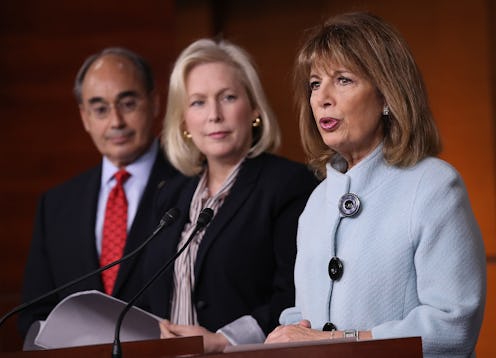News
A Bipartisan Bill Named After The #MeToo Movement Is Taking On Harassment In Congress

The national conversation about sexual harassment in the workplace has reached Congress and female lawmakers are speaking out about misconduct on Capitol Hill. On Wednesday, Rep. Jackie Speier and Sen. Kirsten Gillibrand were joined by two Democrats and two Republicans in introducing the Member and Employee Training Oversight On (ME TOO) Congress Act to tackle sexual harassment on the Hill. (Bustle has reached out to Rep. Speier and Sen. Gillibrand's offices for comment.)
"Zero tolerance is meaningless unless it is backed up with enforcement and accountability," Rep. Speier said in a press release. "Today, I am proud that my colleagues in the House and the Senate, from both sides of the aisle, are joining me to end the era of impunity for disgraceful behavior and to protect the survivors."
House Speaker Paul Ryan had previously ordered all House employees to attend training, but this proposed bipartisan sexual harassment legislation named after the #MeToo campaign would institute more systemic changes. If passed, the bill will institute mandatory annual training for House and Senate members and staff, overhaul the complaint process for survivors, and require more transparency about harassment settlements.
The move comes after Rep. Speier and Virginia congresswoman Barbara Comstock alleged in a congressional hearing Tuesday that they know of sitting congressmen who have sexually harassed employees and faced no punishment.
The following day, Rep. Speier claimed that the House of Representatives spent $15 million settling harassment and discrimination complaints over the last decade, a figure confirmed by the Office of Compliance. However, the $15 million encompasses settlements for all types of complaints, and the OOC told Bustle it does not currently have a report specifically on the number of sexual harassment settlements.
A lack of accountability for the accused is why creating transparency is a main goal of the ME TOO bill, especially considering harassment settlements in Congress are paid with taxpayer money. Because accusers must sign a nondisclosure agreement in order to file a complaint, and the Treasury Department (not the accused employees) distributes settlements, people working on Capitol Hill who have been accused of sexual misconduct remain anonymous.
The proposed legislation would prohibit nondisclosure agreements as a condition of filing a complaint, while still allowing them as part of negotiated settlements. It would also force accused members of Congress who reach a settlement to repay the Treasury, and require the OOC to publish which offices reached harassment settlements, along with the amount paid, on its website every year.
In order to create an environment where employees feel safe coming forward, the ME TOO Congress Act would establish an electronic reporting system and allow employees to file complaints anonymously, making a current requirement that those who file a complaint attend counseling and mediation optional. All protections for those filing complaints would extend to unpaid staff, including interns and pages.
In a statement, New Hampshire Rep. Ann McLane Kuster, who's also sponsoring the bill, described being assaulting while working in Congress and expressed her belief that the system needs to change to protect employees in the future.
As a young staffer I was assaulted by a guest of the Congress and had no training for how to respond, who to turn to, or what my rights were. This is a long overdue change.
Now that it's been introduced in both the House and the Senate, the ME TOO Congress Act will go to committee before potentially being brought to a vote.
Sen. Gillibrand further explained in a press release that bill is needed to ensure everyone working on Capitol Hill feels safe coming to work — and speaking up when they don't, without fear of retaliation.
"Congress should never be above the law, Congress should not play by their own set of rules, and as elected officials, we should be held to the highest standards — not the lowest," she said. "This needs to change."